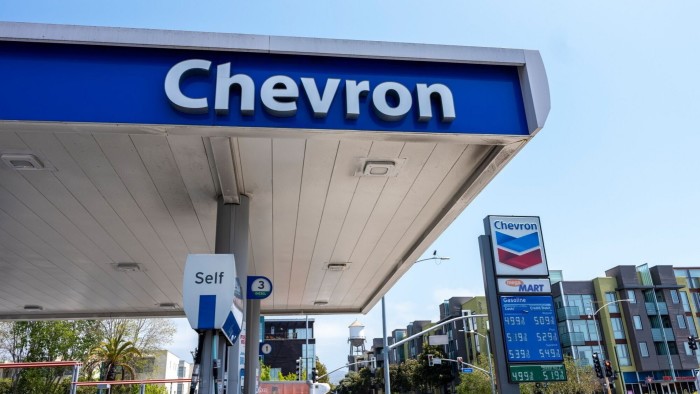Unlock the Editor’s Digest for free
Roula Khalaf, Editor of the FT, selects her favourite stories in this weekly newsletter.
Chevron and ExxonMobil reported sharp falls in quarterly profits owing to falling oil prices and weak refining margins, a sign the oil industry has begun to feel the impact from Donald Trump’s trade war.
Chevron said on Friday that net income fell by more than one-third to $3.5bn in the first quarter, down from $5.5bn a year earlier, and slightly below analysts’ consensus estimates. Revenues fell to $47.6bn, down from $48.7bn a year earlier, as its global production remained flat.
Exxon, the largest western oil producer, reported net income of f $7.7bn in the three months to the end of March, down from $8.2bn a year earlier, and roughly in line with analysts’ forecasts. Revenue of $83.1bn was up slightly from 12 months ago, but missed Wall Street estimates.
The oil industry, which enjoyed record profits when prices shot up following Russia’s full-scale invasion of Ukraine in 2022, is facing weakening demand for its products as US President Donald Trump’s trade war causes the global economy to slow.
The uncertain economic environment has caused analysts to question whether Chevron and other oil majors can continue to meet commitments to pay out a large percentage of their profits in shareholder returns.
Chevron said it would cut spending on share buy backs in the second quarter to $2.5bn-$3bn, compared with $3.9bn in three months to the end of March. However, it said its guidance for annual buybacks of $10bn-20bn remained unchanged. Last year Chevron bought back $15.2bn of its shares.
Chevron shares were down 1.8 per cent in pre-market trading in New York on Friday, but later recovered and were up just over 1 per cent at $138.48 at midday. Exxon’s shares were up 0.2 per cent.
Recommended
“Investors have been laser focused on shareholder returns and Chevron’s results indicate it is unlikely to maintain the high level of payouts against an uncertain and deteriorating demand environment,” said Michael Alfaro, chief investment officer at Gallo Partners, a hedge fund focused on regulatory and policy matters in energy and industrials.
Oil prices fell below $60 a barrel earlier this week — a level that many producers cannot turn a profit — piling pressure on producers to slash costs and slow investments. This week BP said it would cut its quarterly share buyback to $750mn, down from $1.75bn in the previous quarter.
Exxon said it was in a better position than its rivals, due to its low debt levels and cost structure, to withstand the economic challenges and it would not change its strategy.
“In this uncertain market, our shareholders can be confident in knowing that we’re built for this,” chief executive Darren Woods told investors, adding that the plunge in oil prices could open up acquisition opportunities of companies not as well positioned as Exxon.
Exxon is not immune to the impact of tariffs buffeting the global economy but is well positioned to manage the situation, he said.
“I think there is a sensitivity by the Trump administration and other governments around the world to not severely impact the energy sector and the products that we produce . . . there is a very broad recognition of the critical role of the products that we produce in each of their economies,” said Woods.


